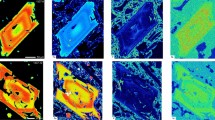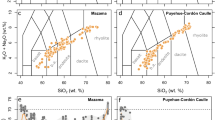Abstract
COMPOSITIONAL variations in pyroclastic deposits have been used as indicators of pre-eruptive chemical gradients in magma chambers and of processes leading to compositional stratification1,2. Theoretical studies of the fluid dynamics of magma withdrawal from stratified chambers have shown that compositional gradients in the products erupted at the surface are not merely inversions of the gradients that had existed in the magma chamber. These studies predict that complex mixing can occur across stratified layers, and that withdrawal of dense underlying layers through overlying low-density layers can occur given certain combinations of discharge rate and magma density contrast3–7. These predictions have yet to be quantitatively verified, however, because simultaneous measurements of eruption dynamics and compositional gradients for a specific eruption have not been collected. Here we explore the relationship between chemical gradients observed in pyroclastic deposits and the dynamics of magma withdrawal, by modelling the temporal evolution of magma discharge rate during the AD 79 eruption of Vesuvius in Italy. The results provide evidence that compositional gradients in zoned deposits cannot be properly interpreted without consideration of the dynamics of magma withdrawal.
This is a preview of subscription content, access via your institution
Access options
Subscribe to this journal
Receive 51 print issues and online access
$199.00 per year
only $3.90 per issue
Buy this article
- Purchase on Springer Link
- Instant access to full article PDF
Prices may be subject to local taxes which are calculated during checkout
Similar content being viewed by others
References
Hildreth, W. J. geophys. Res. 86, 10153–10192 (1981).
Carrigan, C. R. & Eichelberger, J. C. Nature 343, 248 (1990).
Spera, F. J. J. geophys. Res. 89, 8222–8236 (1984).
Spera, F., Yuen, D., Greer, J. & Sewell, G. Geology 14, 723–726 (1986).
Blake, S. & Ivey, G. N. J. Volcan. geotherm. Res. 27, 153–178 (1986).
Blake, S. & Ivey, G. N. J. Volcan. geotherm. Res. 30, 201–230 (1986).
Freundt, A. & Tait, S. Bull Volcan. 48, 325–339 (1986).
Sigurdsson, H., Carey, S., Cornell, W. & Pescatore, T. Nat. geogr. Res. 1, 332–387 (1985).
Carey, S. & Sigurdsson, H. Bull. geol. Soc. Amer. 99, 303–314 (1987).
Carey, S. & Sparks, R. S. J. Bull. Volcan. 48, 109–125 (1986).
Wilson, L. & Walker, G. P. L. Geophys. J. R. astr. Soc. 63, 651–679 (1987).
Cornell, W. thesis. Univ. Rhode Island (1987).
Carey, S. & Sigurdsson, H. Bull. Volcan. 51, 28–40 (1989).
Druitt, T. & Sparks, R. S. J. Nature 310, 679–681 (1984).
Author information
Authors and Affiliations
Rights and permissions
About this article
Cite this article
Sigurdsson, H., Cornell, W. & Carey, S. Influence of magma withdrawal on compositional gradients during the AD 79 Vesuvius eruption. Nature 345, 519–521 (1990). https://doi.org/10.1038/345519a0
Received:
Accepted:
Issue Date:
DOI: https://doi.org/10.1038/345519a0
Comments
By submitting a comment you agree to abide by our Terms and Community Guidelines. If you find something abusive or that does not comply with our terms or guidelines please flag it as inappropriate.



